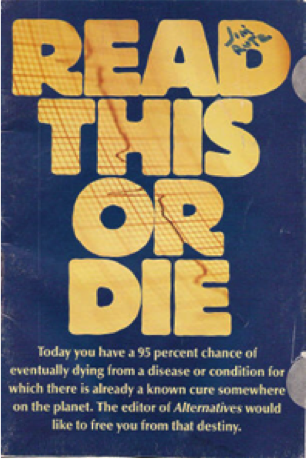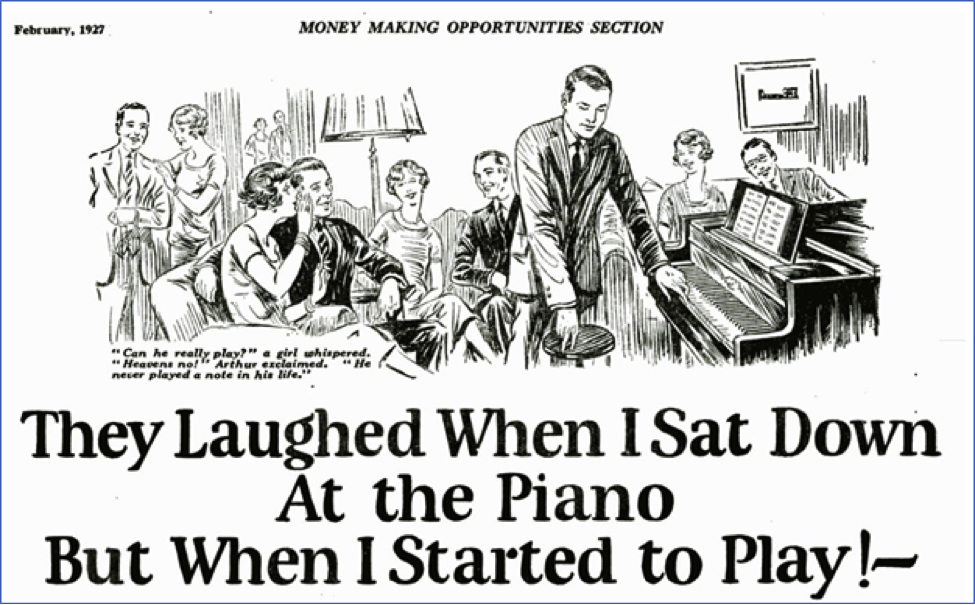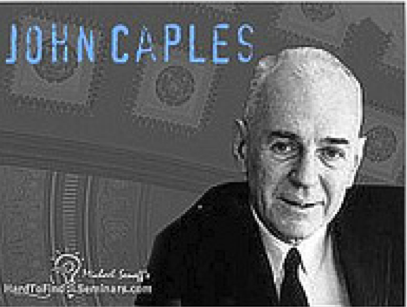What’s the most famous ad in direct-marketing history?
Is it Maxwell Sackheim’s blockbuster that ran for years with the headline:
“Do You Make These Mistakes In English?”
Or is it Joe Karbo’s inspired winner:
“The Lazy Man’s Way to Riches”
Or is it this easily recognizable and constantly-copied treasure…
“Who Else Wants a Screen Star Figure?”
Of course, one of my favorites is the Jim Rutz’s crazy-brilliant and totally-bold ad that started with the headline:
“Read This or DIE!”
If you Google it, you’ll see MY personal copy of the ad is the first one that comes up… with MY nearly-illegible handwriting:

It’s still in a plastic sleeve on my shelf, but I loaned it to another marketer and it’s now available with the click of the mouse (or touchpad) for your viewing enjoyment.
OK… all of the above are amazing headlines, but for today’s lesson, the leader of the pack is John Caples’ stroke of genius:
“They Laughed When I Sat Down At The Piano
But When I Started To Play…”
It’s right up there with the most ripped off headline ever.
In fact, I plugged the first 4 words of that phrase into Google and got 104,000 hits (NOTE: the full ad is at the bottom of the page).
So let’s dig deeper.
WHY is this ad so radically persuasive?
There are dozens of elements and we’ll only focus on a few… but the fact that it’s a super-compelling STORY leads the list.
Not only the story itself, but the headline is a story within a story… and it grabs you FAST.
You’re sucked in before you know what hit you.
Just reading the phrase, “THEY LAUGHED WHEN I…” triggers primal fear.
Its why public speaking is dreaded more than death.

Because being embarrassed, humiliated, or laughed at… is one of the most dreaded human nightmares.
Still… shame is SO much better when it’s someone else who’s getting roasted… like not being able to look away from an accident.
And Caples’ irresistible hook draws us into the next phase of the ad as the story unfolds like this:
“Arthur had just played “The Rosary”. The room rang with applause. I decided that this would be a dramatic moment for me to make my debut. To the amazement of all my friends, I strode confidently over to the piano and sat down.
“Jack is up to his old tricks,” somebody chuckled. The crowd laughed. They were certain I couldn’t play a single note.
“Can he really play?” I heard a girl whisper to Arthur.
“Heavens, no!” Arthur exclaimed. “He never played a note in all his life… But just you watch him. This is going to be good.”
A GENIUS Is Born!
By the way, John Caples, a former Navy officer and trained engineer, was a rookie copywriter when he penned this masterpiece in 1925.
At the time he was working at Ruthrauff & Ryan in New York.
The story goes that on Caples’ first day, his boss, a man named Ev Grady, brought him 2 big piles with hundreds of ads.
The first and smaller pile, was packed with winners.
The second pile, a 7-inch monster, was a study in failures.
It was Caples job to study both piles carefully so he’d know how to write winners.
Two months later, “They Laughed…” was published in Physical Culture magazine with astonishing results.
 Here’s a quick note about Caples later success:
Here’s a quick note about Caples later success:
“In 1927 John Caples, who later would become the world’s authority on copy testing, joined BDO. In his 1931 book, “Tested Advertising Methods,” he declared that the average American is 13 years old mentally, and that a copywriter should ‘use words you would expect to find in a fifth-grade reader.’ He also strongly advised against humor.”
Most people don’t know that Caples took this success and immediately turned it into another.
How’d he do it?
By doing what so many of us have done along the way… “swiping” his own ad and turning it into this one for Doubleday, Page & Co.:
“They grinned when the waiter spoke to me in French—but their laughter changed to amazement at my reply.” It was another plum for the young adman.”
Obviously, just about everyone and their brother have done the same thing.
Just plug it into Google if you want more examples.
Here are a couple more just in case.
Some seem like a stretch, but the knock-offs just keep coming:
“They All Laughed When I Told Them The 30 Minute Workouts Would Help Me Lose Weight… But I Got The Last Laugh When They Saw Me In My Bikini.”
“They Laughed When I Said There Was a Secret to Writing Good Headlines…”
“They All Laughed When I Said I Was Going To Create A Profit Pulling Website Quickly & Easily… But When I Made My First Sale Just 4 Hours Later …!”
OK, now back to the ad where…
“… The Room Resounded With A Sudden Roar Of Applause!”
 Here’s where it really gets good… because you don’t want to start with a bang and then have your precious momentum fizzle.
Here’s where it really gets good… because you don’t want to start with a bang and then have your precious momentum fizzle.
But Caples has no trouble keeping the emotions rolling…
“Then I Started To Play”
Instantly, a tense silence fell on the guests. The laughter died on their lips as if by magic. I played through the first few bars of Beethoven’s immortal Moonlight Sonata. I heard gasps of amazement. My friends sat breathless – spellbound!”
By the way, also notice the powerful “dual path of readership.”
In other words, you can just skim the subheads and get the gist of what it’s all about,
so you’ll be drawn back into the ad to read more.
The dual path is simply these subheads…
Then I Started To Play
A Complete Triumph!
How I Learned to Play Without a Teacher
Play Any Instrument
Send for Our Free Booklet and Demonstration Lesson
Then we dive deeper into the emotions of the story.
They may seem corny or over-the-top by today’s standards, but this is EXACTLY what we want to elicit in our prospects and customers.
We want the raw emotion… the lizard brain stuff that’s still operating in all of us at a 3-to-5-year old level:
“I played on and as I played I forgot the people around me. I forgot the hour, the place, the breathless listeners. The little world I lived in seemed to fade – seemed to grow dim – unreal. Only the music was real. Only the music and visions it brought me. Visions as beautiful and as changing as the wind blown clouds and drifting moonlight that long ago inspired the master composer. It seemed as if the master musician was speaking to me – speaking through the medium of music — not in words but chords. Not in sentences but in exquisite melodies!”
With this set up, Caples elaborates on our childhood fantasies.
Because this next segment is about everything from rags-to-riches, to getting even with all the bullies we’ve ever faced.
It’s also the triumph of the underdog in just a few sentences…
 “As the last notes of the Moonlight Sonata died away, The room resounded with a sudden roar of applause. I found myself surrounded by excited faces. How my friends carried on! Men shook my hand –wildly congratulated me – pounded me on the back in their enthusiasm! Everybody was exclaiming with delight – plying me with rapid questions… “Jack! Why didn’t you tell us you could play like that?” … “Where did you learn?” – “How long have you studied?”
“As the last notes of the Moonlight Sonata died away, The room resounded with a sudden roar of applause. I found myself surrounded by excited faces. How my friends carried on! Men shook my hand –wildly congratulated me – pounded me on the back in their enthusiasm! Everybody was exclaiming with delight – plying me with rapid questions… “Jack! Why didn’t you tell us you could play like that?” … “Where did you learn?” – “How long have you studied?”
“How I Learned to Play Without a Teacher!”
We’re around the final turn and heading down the stretch.
Caples is about to segue into the pitch.
And it happens almost imperceptibly as you innocently follow the normal conversation which addresses all the usual objections:
“A few months ago,” I continued, “I saw an interesting ad for the U.S. School of Music – a new method of learning to play which only costs a few cents a day! The ad told how a woman had mastered the piano in her spare time at home – and without a teacher! Best of all, the wonderful new method she used, required no laborious scales – no heartless exercises – no tiresome practicing. It sounded so convincing that I filled out the coupon requesting the Free Demonstration Lesson.”
This little paragraph is a lesson by itself.
My favorite parts are the emphasis on how easy and inexpensive this “NEW” method is…
>>> Learn in your spare time (at home)…
>>> NO teacher required…
>>> NO laborious scales…
>>> NO heartless exercises…
>>> NO tiresome practicing!
That’s a hilarious phrase… “No heartless exercises”… but it’s exactly how people feel when they’re practicing and seem to be getting nowhere.
The final part of the pitch shifts out of conversational mode and into a straightforward offer which emphasizes how many people “now play their favorite instrument.”
How long does it take to learn?
“Half the usual time,” whatever that is… but it sounds good.
And you don’t need any unusual talent!
“You too, can now teach yourself to be an accomplished musician – right at home – in half the usual time. You can’t go wrong with this simple new method which has already shown 350,000 people how to play their favourite instruments. Forget the old fashioned idea that you need special “talent”. Just read the list of instruments in the panel, decide which one you want to play, and the U.S. School will do the rest. And bear in mind no matter which instrument you choose, the cost in each case will be the same – just a few cents a day. No matter whether you are a mere beginner or already a good performer, you will be interested in learning this new and wonderful method.”
Also note one subtle phrase that’s easy to overlook.
It’s another way they’ve implied how easy this “New” method is:
“Just read the list of instruments in the panel, decide which one you want to play, and the U.S. School will do the rest.”
It gives you a good feeling that, “They’ll do the rest.”
OK, that’s it for today… except…
If you really want John Caples brilliance to reverberate in your own marketing…
… DO what I’ve suggested in previous blogs.
In other words, follow Gary Halbert’s recommendations to WRITE IT OUT LONGHAND.
Not just once, but over and over.
And read it out loud.
And memorize a few sections.
That way you’ll drive it deep into your subconscious and it will flow from your fingertips as you make piles of money.
Happy marketing!
P.S. And please leave your comments.
Let us know what your favorite all-time headlines, ads, and copywriters are.
Thanks for another golden nugget on a Sunday afternoon.
Great copy! Emotionally connecting with your propects is paramount – meeting their emtional needs.
What an awesome post and a reminder of the simple truths we often embellish to make better copy, we think?
Great! I used to skim through posts. But this post I read every word and want read it again.
Thanks, Hilary. I appreciate the generous feedback!
A thorough, point-by-point examination of one of the most famous ads in marketing history. This article exposes insights I never would have thought of. Well done!